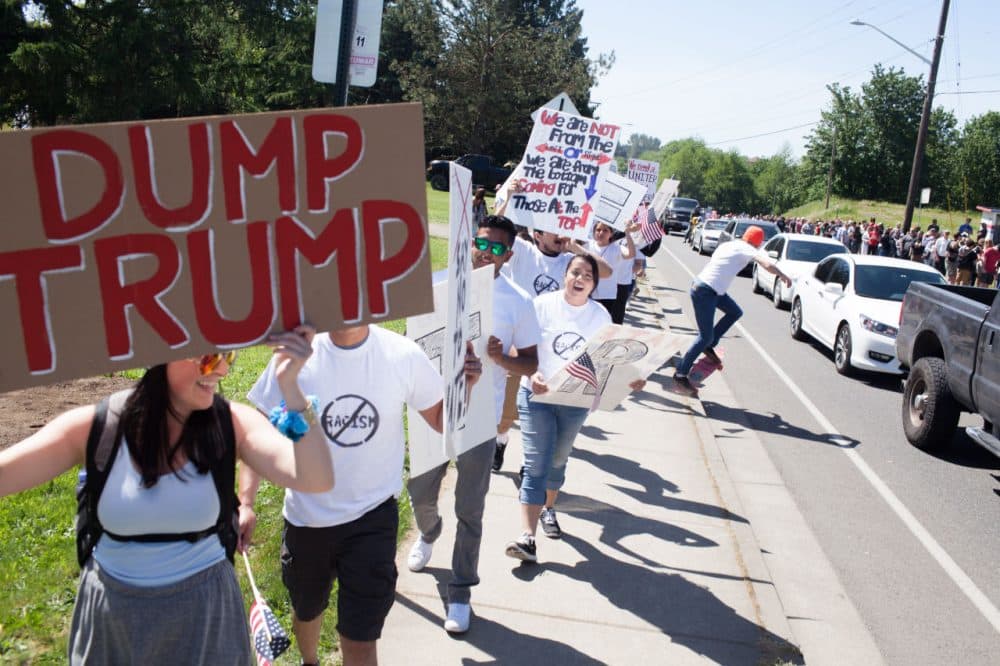Advertisement
'Small Window' Remains For An Independent Run
Resume
#NeverTrump Republicans are still searching for someone to run against Donald Trump, the likely party nominee. Yesterday Ted Cruz, who dropped out of the race last week, ruled out running as an independent. A third-party candidate has never been elected President of the United States.
Ballotpedia's Sarah Rosier tells Here & Now's Jeremy Hobson that there is still a small window of time for an independent candidate to put his or her name on state ballots, but there's a developing split in the #NeverTrump movement that makes it less likely that Republicans against Trump will settle on a candidate to run against him.
Interview Highlights: Sarah Rosier
Is there still time for an Independent candidate to qualify for the ballot?
“There is a small window still left, but it is closing very quickly.”
How long is left?
“Well Texas has already technically had its filing deadline pass for independent candidates on Monday, that was two days ago, so we’re looking at now a few filing deadlines still to come in June, but largely it takes a strong organization in every state to pull these required signatures, so we have a few weeks here where candidates can get organized, but a lot of upcoming deadlines and a lot of signatures to collect in the meantime.”
There have been talks that Texas’ deadline could be challenged in court. Is that true?
“There is. We saw the case Anderson v. Celebrezze in ’83 it was decided by the Supreme Court, and that had filing deadlines in mid-March that were overturned, including Ohio’s, the big one that they were challenging. John Anderson was an independent candidate in 1980 and he did manage to get on all 50 ballots by challenging these early filing deadlines, so we have seen this precedent, but it would be a hassle for any candidate.”
What was notable about Anderson’s run for the presidency?
“It is significant that he was on all 50 ballots, especially for an independent, unaffiliated candidate. For much of election history, we see that a lot of the smaller, third-party candidates who are even the Libertarian or Green party, they almost have a leg up. They have this party organizing system behind them and I think its 17 states where, if you belong to one of these third parties, be it Libertarian, Green or Reform, you can have a quick fast-track to get on the ballot. So if you do become the Green Party nominee, Jill Stein will already have the advantage of being on 17 ballots because the state recognizes the party.”
But a third party candidate has never won the presidency.
“Correct.”
Is it likely the Libertarian Party will be on the ballot for all 50 states this election year?
“They are predicting they will be on all 50 ballots, so that will be interesting especially in this current context that we have, where we see a lot of the, what I call, ‘conservitarians’ who may be members of the Republican Party, but they are dissatisfied with their nominee, or presumptive nominee in Trump. They are looking to the Libertarian Party, so if they are on all 50 ballots, they could pull a significant number of votes from Mr. Trump.”
Might the Green Party be a factor for Democrats this year?
“Yes. The news has been focusing on the anti-Trump feelings in the country, but there is also going to be that in a very big way on the Democratic side, even in April. Again, Mr. Sanders is still running, but in April Bernie Sanders supporters said they would not support Hillary in November. So this is going to be an increasingly dissatisfied electorate. As candidates stay in longer, a lot of times their supporters become more entrenched with their particular candidates. We could see that number increasing for the Democrats as well, and there has been, if you’re looking at social media or talk to some of the really staunch Bernie Sanders supporters, Jill Stein could be a factor this year.”
Guest
- <a href="https://ballotpedia.org/Ballotpedia:Sarah_Rosier" target="_blank">Sarah Rosier, federal desk editor for Ballotpedia. She tweets @sarah_e_rosier.
This segment aired on May 11, 2016.